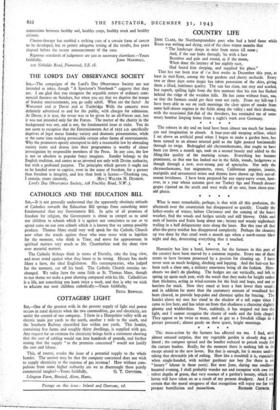COUNTRY LIFE JOHN CLARE, the Northamptonshire poet who had a
brief fame while Keats was writing and dying, said of the close winter months that " The landscape sleeps in mist from morn till noon ; And, if the sun looks through, 'tis with a face Beamless and pale and round, as if the moon, When done the journey of her nightly race, Had found him sleeping, and supplied his place."
That has not been true of 1- se first weeks in December this year, at least in mid-Kent, among the hop gardens and cherry orchards. Every two or three days some magic has taken possession of the skies, giving them a lifted, luminous quality. The sun has risen, not rosy and scarfed, but superb, spilling light from the first moment that his rim has flashed behind the ridge of the wealden hills. He has come without frost, too, so that the farmers could get their men out early. From my hill-top I have been able to see on such mornings the clear spires of smoke from some half-dozen engines in the fields along the valley ; and their droning, with the occasional flak-flak of the threshers, has reminded me of some weary bomber limping home from a night's work over Germany.
* * * *
The colours in sky and on land have been almost too much for human eye and imagination to absorb. A four-year-old weeping willow, which I set above an artificial pond when I began to make a garden here, has been turned to an almost oriental gold as the light poured horizontally through its twigs. Bedraggled old chrysanthemums, that ought to have been cut down a month ago, took on a second beauty and added to the Ming-like quality of the morning scenes. Everything has become
prominent, so that one has looked out in the fields, woods, hedgerows as though through a new, over-strong pair of spectacles. Not only the chrysanthemums, but mignonette, roses, Californian poppies, jasmin, marigolds and ornamental mints and rhymes have shown up their out-of- season lavishness. I have been prepared for any topsy-turvy event, how- ever, in a year whose autumn gave me Turkey figs and French dessert grapes ripened on the south and west walls of an oast, from .three-year- old plants.
* * * * What is most remarkable, perhaps, is that with all this profusion, the aftermath over the countryside has disappeared so quickly. Usually the hither-weeks of winter, before Christmas and the coming of the heavy weather, find the woods and hedges untidy and still blowsy. Odds and ends of berries and fruits hang about too ; briony and woody nightshade trailing in a half deliquescent state along the lanes. But this year all that after-the-party residue has disappeared completely. Perhaps the cleaning up was done by that cruel week a month ago when a north-easter blew night and day, desiccating everything that it touched.
* * * *
Humanity has lent a hand, however, for the farmers in this part of the country have been moved by a common impulse. Every one of them seems to have become possessed by a passion for cleaning up. I have never seen so much hedging, ditching and lopping. And the hair-cut has been such a close one, a military smartness being all the fashion. Here- abouts we don't do plashing. The hedges are cut vertically, and left to spring up again each year, with the result that they make for height rather than thickness, acting as wind-screens for the fruit and hops, and not as barriers for stock. Now they stand at least a foot lower than usual ; and in addition far more than the customary amount of woodland has been cleared, to provide hop-poles and chestnut spiles for fencing. The hamlet above my oast has stood in the shadow of a tall copse since came to live here, and has taken on from that shadiness a character slightly gloomy and widdershins. Now, suddenly, it has stepped out into the light, and I cannot recognise the cluster of roofs and the little chapel They appear to be twice as many, and as gay as a Swedish village in a picture postcard ; almost gaudy on these queer, bright mornings.
* * * *
Thi mass-action by the farmers has affected me too. I find, with almost amused surprise, that my vegetable garden is already dug and limed ; the compost spread and the bonfire reduced to potash ready for the currant bushes. Really, for the moment there is nothing left to do except attend to the new lawns. But that is enough, for it means under- taking that detestable job of rolling. How like a treadmill it is, especially when single-handed, with neither gardener nor boy (for there is no " luxury" labour in these parts). But next June, during one swallow- haunted evening, I shall probably wander out and recognise with awe the velvet depths of green, that very essence of a garden's beauty, which my lawns will have taken on as a result of my present drudgery. And I ani certain that the moral smugness of that recognition will repay me for tht






























 Previous page
Previous page